Google Cloud AI stands at the forefront of innovation in machine learning and AI development. By leveraging a suite of sophisticated tools and platforms, Google Cloud AI enables organizations to build, deploy, and scale AI models with unprecedented efficiency. Key offerings such as AutoML, TensorFlow, and Vertex AI cater to a wide range of needs, from novice users requiring automated model training to expert data scientists seeking high customization capabilities. These tools not only accelerate the development process but also ensure robust performance, reliability, and scalability of AI solutions. With Google Cloud AI, organizations can unlock the full potential of their data and transform it into actionable insights.
Toc
Introduction to Google Cloud AI
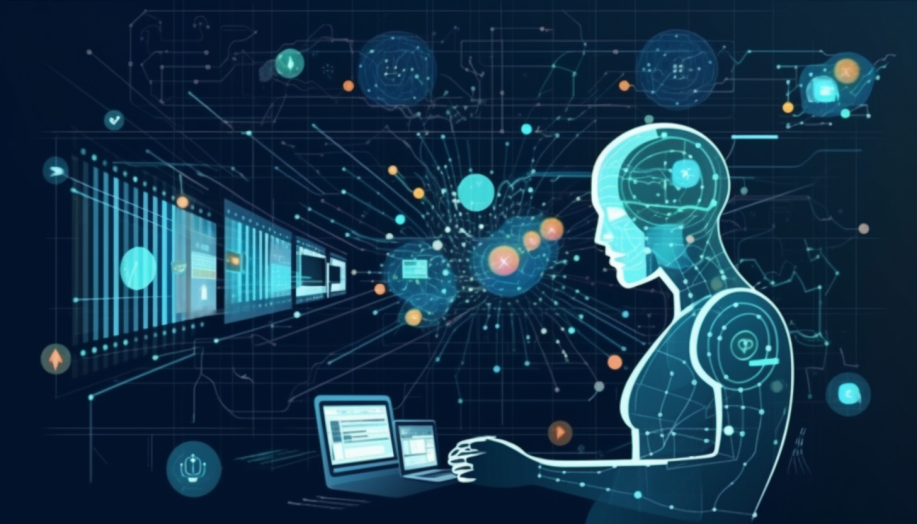
In the rapidly evolving world of artificial intelligence, staying ahead of the curve is crucial for developers. Google Cloud AI offers a suite of state-of-the-art tools and services designed to empower AI developers to build, deploy, and scale their AI models efficiently. With its robust infrastructure and integration capabilities, Google Cloud AI is transforming the landscape of machine learning and AI development.
What is Google Cloud AI
Google Cloud AI is a comprehensive platform that offers a range of tools, frameworks, and managed services to help developers and organizations harness the power of machine learning and artificial intelligence. At its core, Google Cloud AI provides the infrastructure necessary to train and deploy AI models, from small-scale prototypes to production-level solutions. By offering pre-trained models and custom ML tools, Google Cloud AI lowers the barrier to entry for AI development, enabling users to leverage sophisticated algorithms without needing extensive machine learning expertise. Furthermore, the platform integrates seamlessly with other Google Cloud services, ensuring streamlined workflows and efficient resource management. Whether you’re a startup aiming to implement basic AI capabilities or an established enterprise looking to scale complex machine learning models, Google Cloud AI has the tools and resources needed to succeed.
How Google Cloud AI Works
At the heart of Google Cloud AI’s functionality is its seamless integration with Google Cloud’s vast ecosystem. When a developer begins a project, they can choose from a variety of pre-trained models provided by Google or build their custom models using tools like TensorFlow and AutoML. The process starts with data preparation, where the platform aids in cleaning, labeling, and structuring data to ensure optimal performance during model training.
Once the data is ready, developers can leverage Google Cloud’s powerful compute resources to train their models. These compute resources include GPUs and TPUs, designed to handle the intensive computations required for machine learning. Developers can monitor their training progress in real-time, making adjustments as needed to improve model accuracy and efficiency.
After training is complete, the deployment phase begins. Google Cloud AI simplifies this process by providing robust deployment options that can scale with your application’s needs. Models can be deployed to serve predictions in real-time or batch processes, depending on the use case. Additionally, Google Cloud AI offers tools for model management and versioning, ensuring that developers can track changes and maintain high-quality AI solutions over time.
In summary, Google Cloud AI provides a comprehensive and integrative approach to machine learning and AI development, from data preparation and model training to deployment and management. Its scalable infrastructure and flexible tools empower developers to create cutting-edge AI solutions that can adapt and grow with their projects.
Benefits of Google Cloud AI
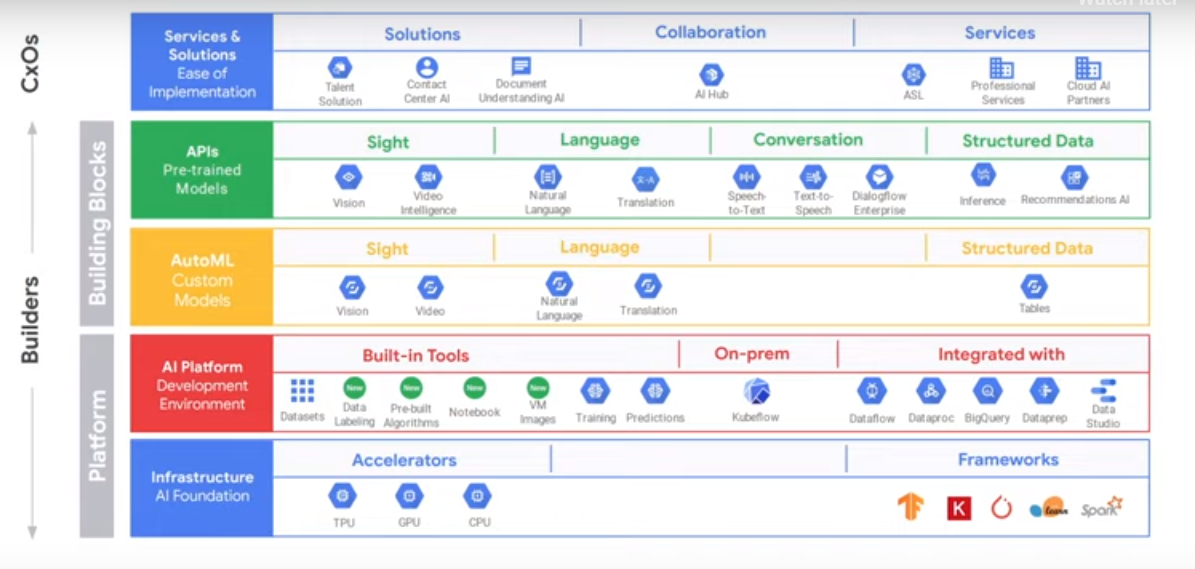
Google Cloud AI brings a multitude of advantages to organizations of all sizes, making it a preferred choice for AI and machine learning projects. Here are some of the key benefits:
Scalability and Flexibility
One of the standout features of Google Cloud AI is its ability to scale resources up or down based on project requirements. Whether you’re running a small-scale experiment or deploying an enterprise-level machine learning solution, Google Cloud AI can accommodate your needs dynamically. This flexibility ensures optimal performance and cost-efficiency.
Advanced Security
Security is a top priority for Google Cloud AI. The platform incorporates Google’s advanced security measures to protect data, models, and applications. This includes encryption in transit and at rest, identity and access management, and robust compliance with industry standards. Organizations can confidently build and deploy their AI solutions, knowing that their data is secure.
Integrated Ecosystem
Google Cloud AI seamlessly integrates with other Google Cloud services, such as BigQuery, Cloud Storage, and Kubernetes Engine. This integration simplifies the workflow, enabling developers to leverage existing tools and services without the need for extensive configuration or manual intervention. As a result, projects can be executed more efficiently, with less time spent on setup and more on innovation.
Cost-Effectiveness
Google Cloud AI offers a pay-as-you-go model, allowing organizations to pay only for the resources they actually use. This cost-efficiency is further enhanced by the platform’s ability to automatically optimize resource utilization during model training and deployment. By minimizing waste and maximizing performance, Google Cloud AI helps organizations achieve their AI goals without breaking the bank.
Innovation and Support
Google Cloud AI is built on cutting-edge research and development in the field of artificial intelligence. Users benefit from the latest advancements in machine learning algorithms, frameworks, and tools. Additionally, Google Cloud provides extensive documentation, tutorials, and customer support, ensuring that developers have access to the resources they need to succeed.
Enhanced Collaboration
The platform also facilitates collaboration among teams through tools like AI Hub and integrated project management features. This collaborative environment allows data scientists, developers, and business analysts to work together seamlessly, fostering innovation and accelerating project timelines.
Use Cases of Google Cloud AI
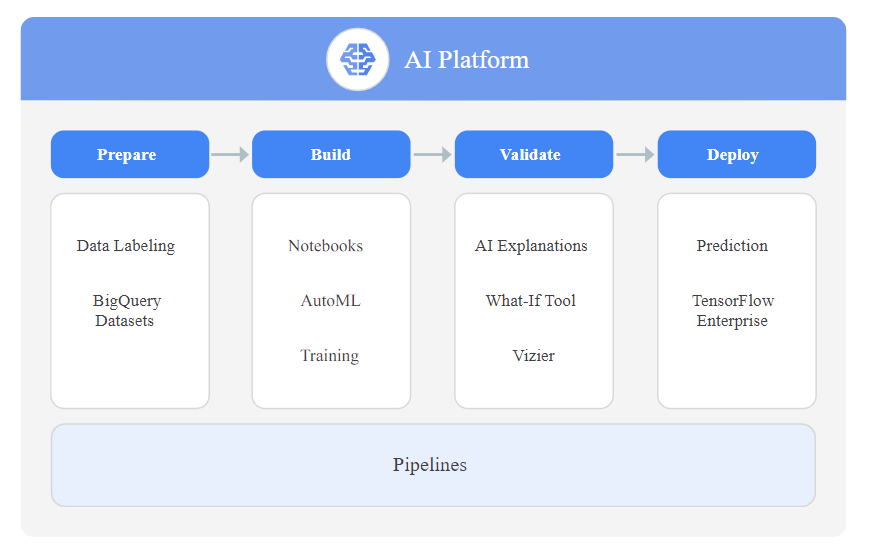
Google Cloud AI is versatile and can be applied across various industries to address unique challenges and drive innovation. Here are some specific use cases that highlight its capabilities:
Healthcare
In the healthcare sector, Google Cloud AI is revolutionizing the way medical diagnostics and research are conducted. AI-powered models can analyze medical images, such as X-rays and MRIs, to detect anomalies and assist in early diagnosis of conditions like cancers and fractures. Natural language processing (NLP) tools can help in deciphering complex medical records, enabling quicker patient assessments and personalized treatment plans. Moreover, AI-driven predictive analytics assist in foreseeing patient deterioration, thus improving patient outcomes and operational efficiency.
Retail
Retailers are leveraging Google Cloud AI to enhance customer experiences and optimize operations. AI algorithms analyze vast amounts of customer data to deliver personalized recommendations and dynamic pricing. Moreover, inventory management is significantly improved as AI predicts demand trends, reducing the instances of overstocking or stockouts. Retailers can also employ AI-driven chatbots to provide 24/7 customer support, ensuring a seamless shopping experience.
Finance
In the financial sector, Google Cloud AI aids in fraud detection and risk management. Machine learning models analyze transaction patterns to identify fraudulent activities in real time, protecting both institutions and customers. Additionally, Google Cloud AI can forecast market trends, providing valuable insights for investment strategies. Automated systems built on AI can also streamline processes like loan approvals and credit scoring, making financial services more efficient and accessible.
Manufacturing
Manufacturers are adopting Google Cloud AI to optimize production lines and enhance quality control. Predictive maintenance powered by AI helps foresee equipment failures before they occur, minimizing downtime and extending the lifespan of machinery. Computer vision models are used to inspect products for defects more accurately than human inspectors, ensuring higher quality standards. This technology also plays a role in supply chain management by optimizing logistics and inventory levels based on AI-driven forecasts.
Customer Service
Businesses across all sectors are enhancing customer service with Google Cloud AI. AI-powered virtual assistants and chatbots handle routine inquiries, providing quick and accurate responses, which frees up human agents to tackle more complex issues. Sentiment analysis tools help businesses understand customer feedback and adapt their strategies accordingly. AI can also analyze call transcripts to identify common problems and improve the overall customer service experience.
Education
In education, Google Cloud AI is enabling personalized learning experiences. Platforms can use AI to assess students’ abilities and tailor educational content to meet their specific needs. This helps in bridging gaps in knowledge and accelerating learning. Additionally, AI-driven analytics provide educators with deeper insights into student performance, enabling them to intervene promptly when a student is struggling.
Google Cloud AI’s broad range of applications underscores its potential to transform various industries by making operations more efficient, enhancing customer experiences, and fostering innovation. By harnessing the power of AI, organizations can tackle complex challenges and stay ahead in today’s competitive landscape.
Google Cloud AI Empowering AI Development
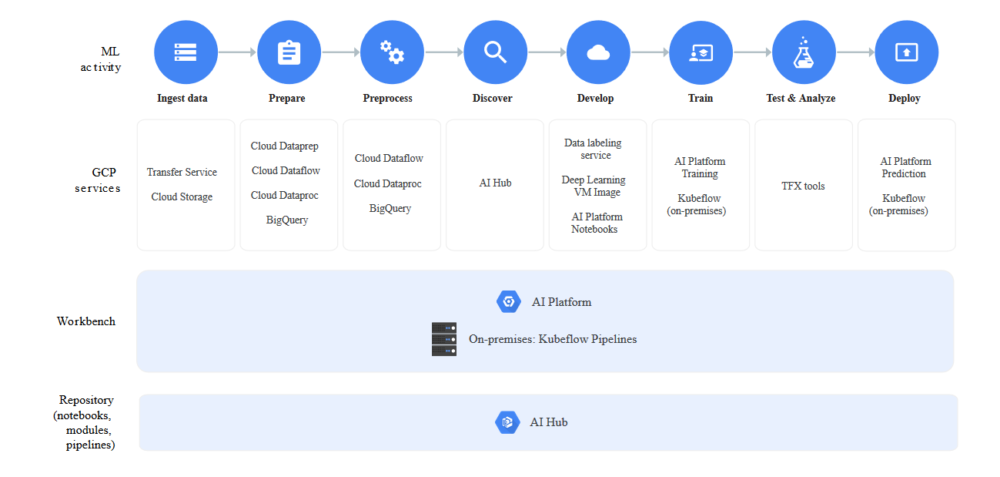
Google Cloud AI continues to evolve and expand its capabilities, enabling organizations of all sizes to harness the full potential of artificial intelligence. With its robust features and comprehensive tools, Google Cloud AI empowers developers to build advanced models quickly and efficiently, accelerating the pace of innovation in various industries.
AutoML
AutoML is a suite of tools within Google Cloud AI that enables developers with little or no background in machine learning to build custom models. With AutoML, users can upload their data and let Google Cloud AI handle the rest, from training models to deploying them for use. This feature makes AI accessible to organizations that may not have extensive resources for data science expertise.
Deep Learning VMs
Deep Learning VMs are pre-configured virtual machines that come with popular deep learning frameworks like TensorFlow and PyTorch already installed. This allows developers to start building complex models right away without having to worry about setting up environments. Deep Learning VMs also come with access to GPUs and TPUs, making it easier to train and deploy high-performing models.
AI Platform Notebooks
AI Platform Notebooks provide a streamlined environment for interactive development of machine learning models. Users have access to JupyterLab notebooks and can leverage Google’s powerful computing resources to train and deploy models quickly. This feature also allows for easy collaboration and sharing of notebooks with team members.
Cloud TPU
Cloud TPU (Tensor Processing Unit) is a specialized hardware unit designed to accelerate machine learning workloads. With its high performance and scalability, Cloud TPUs speed up the training of complex deep learning models significantly.
Google Cloud AI’s tools and services make it easier for developers to build sophisticated AI solutions without needing extensive expertise in machine learning. This democratization of AI development is leveling the playing field for organizations that may not have had access or resources to invest in expensive AI infrastructure before.
Use Cases and Success Stories

Numerous organizations have already successfully implemented Google Cloud AI in their operations, driving positive results and transformative changes. Some notable use cases include:
Spotify
Spotify leverages Google Cloud AI to improve its recommendation system, providing users with personalized music suggestions based on their listening habits and preferences. This has contributed to increased user engagement and satisfaction. Additionally, Spotify uses Google Cloud AI for speech-to-text transcription and translation, enabling them to offer podcasts and music in various languages.
Airbus
Airbus employs Google Cloud AI to enhance aircraft production and maintenance. By incorporating predictive maintenance algorithms, Airbus can foresee potential issues with aircraft components before they cause significant delays. This not only reduces downtime but also ensures the safety and reliability of flights. Additionally, AI-driven analytics help optimize manufacturing processes by identifying inefficiencies and suggesting improvements, ultimately leading to higher productivity and reduced operational costs.
The New York Times
The New York Times utilizes Google Cloud AI to streamline content management and enhance reader experiences. Through machine learning models, the publication can analyze vast amounts of data to understand reader preferences and deliver personalized content recommendations. Additionally, AI is used to automate the tagging and categorization of articles, making it easier for journalists to manage their work and for readers to find relevant stories quickly. This application of AI helps The New York Times maintain its competitive edge in the digital news landscape.
L’Oréal
Leading beauty company L’Oréal uses Google Cloud AI to revolutionize its marketing and product development processes. By harnessing the power of AI, L’Oréal can analyze consumer data to identify emerging trends and customer preferences. This enables the company to develop new products that meet the evolving needs of its clientele. Furthermore, AI-driven marketing tools allow L’Oréal to create more targeted and personalized advertising campaigns, enhancing customer engagement and driving sales growth.
Google Cloud AI continues to demonstrate its versatility and effectiveness across a wide range of industries. From improving operational efficiency to enhancing customer experiences, the applications of AI are vast and varied. As more organizations adopt these advanced technologies, the potential for innovation and transformation will only continue to grow, solidifying AI’s role as a critical driver of progress in the modern world.
Conclusion
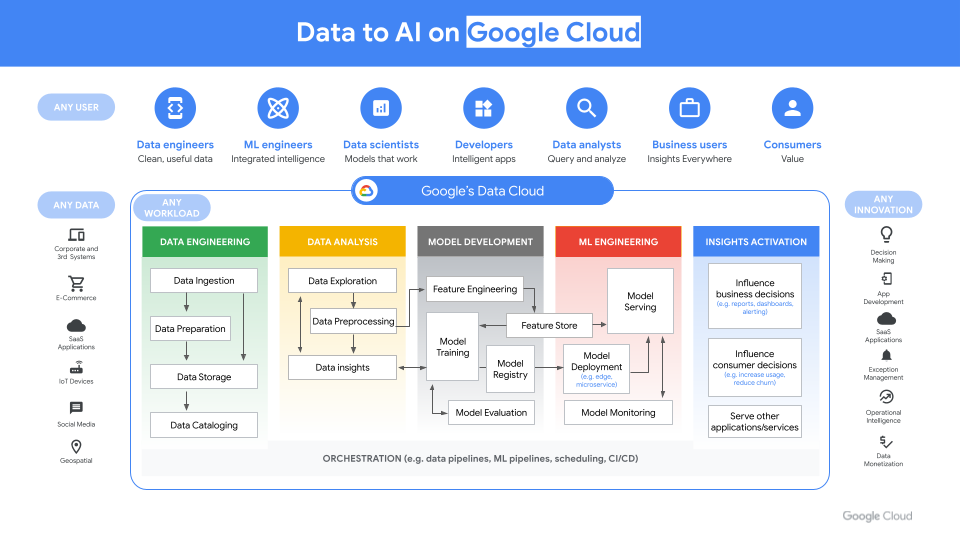
Google Cloud AI is a powerful tool for AI developers looking to build, deploy, and scale advanced machine learning models. With its state-of-the-art capabilities, high-performance infrastructure, and seamless integration with other Google Cloud services, it offers unparalleled opportunities for innovation and efficiency.
By leveraging Google Cloud AI, developers can create customized AI solutions that drive business success across various industries, from healthcare and finance to e-commerce and entertainment. The future of AI development is here, and Google Cloud AI is at the forefront, empowering developers to push the boundaries of what’s possible.












